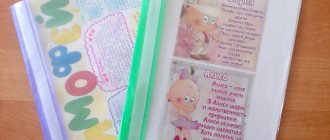FAMILY TRADITIONS: CORRECT DAILY ROUTINE
The well-being of the family and successful upbringing in the family also depend on the formation of the correct (optimal) daily routine, taking into account the life situations of each family and its observance by each family member. The family's daily routine includes the entire daily routine during the day - time for proper sleep, hardening procedures, orderly meals, all types of work and rest. Age and condition are taken into account
children's health. The family's daily routine should have educational significance, which is only possible if children are required to get used to it without being reminded by adults. Seniors must exercise control over the quality implementation of routine tasks and work assignments, evaluate them, and provide assistance in case of difficulties.
FAMILY TRADITIONS: JOINT WORK
Joint work is the basis for organizing the life and everyday life of a family, which is based on the equality of all members, involving children in solving economic issues of family life, running the household, and doing feasible work. Children are directly involved in household work, learn to serve themselves, and perform feasible labor duties to help their father and mother. Their success in learning, as well as in general labor education, depends on how the labor education of children before school is delivered. In preschool age, children are very mobile, they cannot concentrate on one thing for a long time, or quickly switch from one type of activity to another. Schooling will require concentration, perseverance, and diligence from the child. Therefore, it is important, even in preschool age, to accustom the child to the thoroughness of the tasks he carries out, to teach him to complete the work he has begun,
show persistence and perseverance. It is necessary to develop these qualities (except for play) in the process of everyday work, including the child in the collective work of cleaning the room, in the garden.
The presence in children of such an important personality quality as hard work is a good indicator of their moral education. By how a child relates to work, what work skills he has, others will judge his value in society. Love of work and the ability to work in a team are the keys to the success of our children in their future lives.
In addition, it is difficult to overestimate the importance of labor in human life. Physical labor ensures high vitality of muscles and all human organs: it improves all physiological processes in the body - proper breathing, blood circulation, metabolism, growth of the whole body and individual organs. Physical labor is a means of combating fatigue, especially for people engaged in mental work. Forming a work culture, changing types of work, and a reasonable combination of them in a child’s daily routine ensures his successful mental activity and maintains working capacity.
FAMILY TRADITIONS: JOINT HIKES
Excursions and trips with the whole family to the forest, to the river, to pick mushrooms and berries, to
Fishing leaves an indelible impression that a child will carry throughout his life. When communicating with nature, a child is surprised, happy, proud of what he saw, heard the singing of birds - at this time the education of feelings occurs. The feeling of “beautiful” helps to cultivate the need to protect the environment. Excursions and hikes with the whole family are also a good way to educate children patriotically. Introduction to the history of the native land, including the history of the clan and family as its integral part, contributes to the formation of a citizen, teaches children to be responsible before the past and future.
FAMILY TRADITIONS: READING
Reading occupies a special place in raising a child in the family. In preschool age, a child especially loves to listen to fairy tales that adults read to him, stories from the lives of people and animals. From books he learns about good people, about their deeds, about animals, plants. In the fairy tale, the strong, dexterous, fair, honest and hardworking person always wins, while the evil, unkind person is punished by people and society. Listening to a fairy tale, a child does not remain indifferent to the fate of the hero: he worries, worries, rejoices and is upset, that is, he develops feelings and gradually develops an interest in the book. In the future, when the child learns to read on his own, it is important
consolidate interest and develop the skill of independent and systematic reading. This skill does not appear on its own; it requires coordinated and skillful work of the family. Only this will introduce the child to reading, and he will begin to consider books as his companions in acquiring new knowledge. The emerging interest in reading will lead the child to the library or bookstore. He will have his own heroes whom he will imitate.
FAMILY TRADITIONS: HOLIDAYS
Family holidays on the occasion of the birthday of adults and children, as well as other significant dates, such as parents’ wedding day, the day of a memorable event in the life of family members (entry to school, victory in a competition, etc.) have significant educational potential. Family holidays also include holding public holidays in the house such as Mother's Day, Father's Day, Family Day, and professional holidays for adults. Preparing children and adults for the upcoming holiday (coming up with a script, wall newspapers, preparing holiday treats), giving gifts with a special emotional upsurge creates that atmosphere of solemnity, joy and happiness that forms spiritual culture and unites the family as a team.
"FAMILY TRADITIONS: CULTURE OF COMMUNICATION"
The only real luxury is the luxury of human communication. Do we know how to use this luxury in our families, do we teach this to our children?
The family is the child’s first school of communication. In a family, a child learns to respect elders, take care of the elderly and sick, and provide all possible assistance to each other. In communicating with people close to the child, in joint household work, he develops a sense of duty and mutual assistance. The best means of cultivating correct relationships is the personal example of father and mother, their mutual respect, help and care, manifestations of tenderness and affection. If children see good relationships in the family, then, as adults, they themselves will strive for the same beautiful relationships. In childhood, it is important to cultivate a feeling of love for your loved ones - for parents, for brothers and sisters, so that children feel affection for one of their peers, affection and tenderness for their younger ones.
Preschoolers receive their first moral experience in the family, learn to respect their elders, take them into account, learn to do something pleasant, joyful, and kind to people. The moral principles of a child are formed on the basis of and in connection with the intensive mental development of the child, the indicator of which is his actions and speech. Therefore, it is important to enrich children’s vocabulary and, when talking with them, to provide an example of good pronunciation of sounds and words and sentences in general. In order to develop speech, parents should teach children to observe natural phenomena, identify similar and different things in them, listen to fairy tales and stories and convey their content, answer questions and ask their own. Speech development is an indicator of an increase in the child’s general culture, a condition for his mental, moral and aesthetic development.



